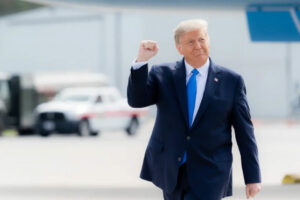Trump version 2.0 likely bad for Philippine labor
FORMER President Donald John Trump’s potential return to the White House and his “America First” policy could mean fewer jobs for Filipinos, labor experts said at the weekend. His government would probably discourage outsourcing, US manufacturing in the Philippines and push tighter immigration rules, Federation of Free Workers (FFW) President Jose Sonny G. Matula told […]

FORMER President Donald John Trump’s potential return to the White House and his “America First” policy could mean fewer jobs for Filipinos, labor experts said at the weekend.
His government would probably discourage outsourcing, US manufacturing in the Philippines and push tighter immigration rules, Federation of Free Workers (FFW) President Jose Sonny G. Matula told BusinessWorld in a Viber message.
“This could reduce job opportunities in the Philippines and create barriers for Filipinos in the US, affecting job security and remittance flows,” he added.
Latest data from the local statistics agency showed that the US remained the top destination of Philippine-made goods in August.
The Republican bet has made stringent trade restrictions among his proposed policies, eyeing to impose 60% tariffs or higher on all Chinese goods as well as a 10% to 20% universal tariff.
Analysts earlier cited the potential weakness of the peso against the dollar amid another Trump presidency.
In the first eight months, cash remittances to the Philippines expanded by 2.9% to $22.22 billion from a year earlier. The US accounted for 41.3% of the total.
On the other hand, a victory for US Vice-President and Democratic presidential nominee Kamala Devi Harris, who is perceived to be”pro-labor,” could benefit Filipino workers, Mr. Matula said.
“Her victory would likely bring policies that support fair labor standards globally, benefiting Filipino workers in industries tied to the US, such as business process outsourcing, electronics, and garment and textile manufacturing,” he added.
Mr. Matula said Ms. Harris’ pro-labor stance would encourage ethical practices and job stability, rather than restrict manufacturing and outsourcing of jobs.
“Her inclusive immigration policies would also protect Filipinos working in the US, especially in healthcare and education, ensuring more secure job pathways and supporting remittances that benefit families in the Philippines,” he added.
There were about two million Filipino immigrants in the US in 2021, making them the fourth-largest national-origin immigrant group after Mexicans, Indians, and Chinese, according to Washington-based Migration Policy Institute.
In a separate statement, the FFW Women’s Network said a Harris presidency is in line with the objectives of the International Labor Organization’s (ILO) Convention 190 or the Violence and Harassment Convention.
“We are convinced that her leadership will be crucial in eliminating violence and harassment in the workplace, which is at the heart of ILO Convention 190,” Union President Ma. Victoria Garzon-Bellosillo, president of the network and head of the CPU Rank-and-File Union-FFW from Iloilo City, said in a statement.
Annie E. Geron, Public Services Labor Independent Confederation president, said the Philippine government is under pressure to ensure that Filipino workers’ rights are protected.
The government of US President Joseph R. Biden, Jr. adopted a global labor strategy centered on trade policy. “This policy explicitly communicated to all countries where the USA has diplomatic, trade and investment relations, that the promotion and respect of workers’ rights are at the center and front of such relations,” she told BusinessWorld in a Viber message.
“To my view, this policy can be used as carrot and stick and notably added pressure to the Philippine government to ensure that [Filipino] workers’ rights and well-being are protected,” she added. — Chloe Mari A. Hufana
















